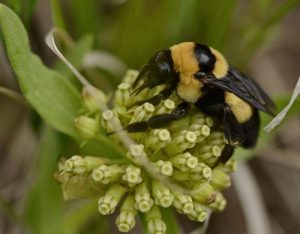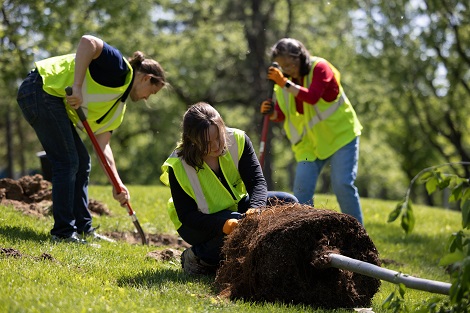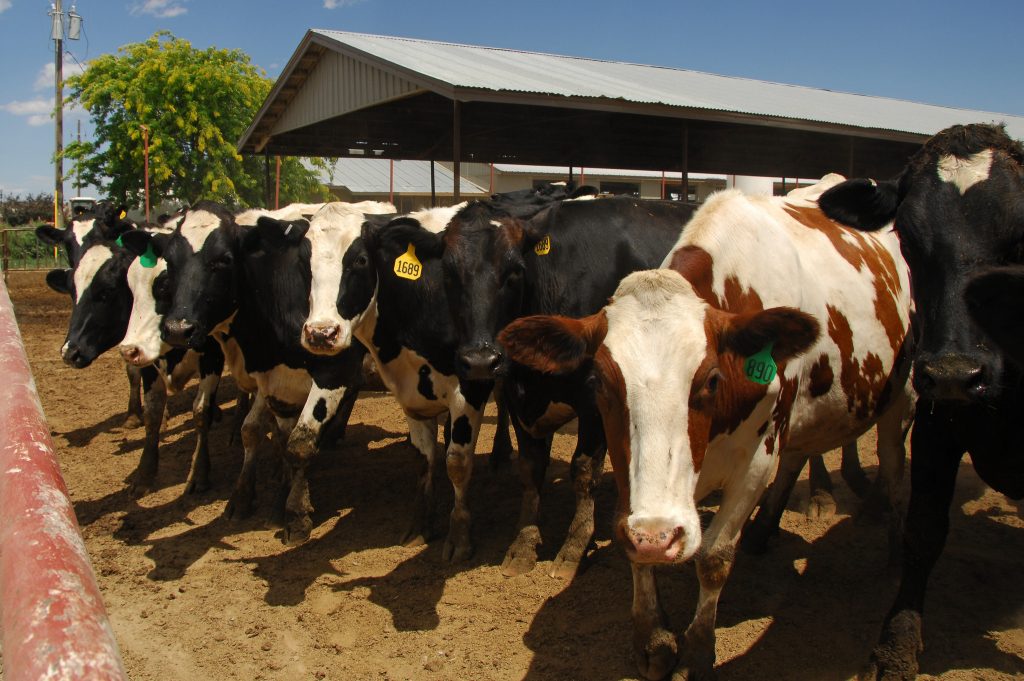CLICK HERE for the latest market quotes from the Iowa Agribusiness Network!
CLICK HERE for the latest market quotes from the Brownfield Ag News Network!
CLICK HERE for the latest market quotes from the Iowa Agribusiness Network!
CLICK HERE for the latest market quotes from the Brownfield Ag News Network!
(Des Moines, Iowa [Iowa Capital Dispatch]) – The Iowa Senate, Wednesday, reconfirmed the director of the state Department of Natural Resources, despite concerns from some Democrats that she is forced to operate as a puppet of Gov. Kim Reynolds. “Kayla Lyon is just like many of Gov. Reynolds’ other appointees and department heads — she can only do so much,” said Sen. Claire Celsi, D-West Des Moines. “She can only do what the boss tells her to do.”
Lyon, 39, of Ames, was appointed to the post by Reynolds in 2019. Her reconfirmation by the Senate this week was prompted by state law, which requires another confirmation vote for appointees after four years. She leads a department of about 890 full-time and 450 seasonal employees. It is charged with maintaining public areas and wildlife and the enforcement of environmental regulations on businesses, cities, drinking water utilities and livestock operations.
A recent DNR evaluation listed more than 700 water body segments in the state that are impaired, meaning they don’t meet water quality standards for recreation, public water supplies and the protection of aquatic life. A primary contributor to the problem is agriculture, which is also under the purview of the Iowa Department of Agriculture and Land Stewardship. State parks also need about $100 million in repairs, and there is a plan to eliminate all park ranger positions, according to the Cedar Rapids Gazette.

Iowa Department of Natural Resources Director Kayla Lyon, left, addresses a joint meeting of the Natural Resource Commission and the Environmental Protection Commission Jan. 22, 2020 at the Wallace State Office Building. (Photo by Perry Beeman/Iowa Capital Dispatch)
Lyon was a lobbyist for dairy farmers and farmers’ cooperatives before joining state government. Her reconfirmation required two-thirds support, and Lyon cleared that threshold with a 40-9 vote. All of those who voted against confirmation were Democrats, and they were just over half of the Democrats in the chamber.
The DNR’s funding requests have been roughly static in recent years. Sen. Tom Shipley, R-Nodaway, disputed that the DNR is prevented from taking sufficient action to protect the environment, along with Democrats’ claims of “how bad our environment is.” He said the resurgence of certain animal populations, such as bald eagles and whitetail deer, is evidence that conditions are improving. “We have otters in the river we never used to have,” Shipley said. “We have turkeys in the trees that we never used to have. We have all kinds of bobcats.”
Lyon did not address the Democrats’ allegations but told Iowa Capital Dispatch: “It’s been an honor to serve as the director of the Department of Natural Resources. I’m grateful for the opportunity to work alongside DNR staff across the state, and I’m humbled by their extensive knowledge and passion. My appreciation for this job doesn’t stop at the office or in the field with staff; it extends to when I’m spending time enjoying the resources with my family.”
(Des Moines, Iowa via the Iowa Capital Dispatch) – The Iowa House passed a bill Wednesday that would prohibit imitation meat products from being misleadingly labeled as meat — with an amendment prohibiting people from purchasing egg substitutes through food assistance programs. Senate File 2391, approved by a 60-34 vote, establishes fines for businesses that create non-meat products and label them with terms used for butchered meat, if the labels do not also include terms like “fake” or “vegetarian” specifying that they are not traditional meat products.
The bill, largely targeting substitute meat products that are made from insects, lab-grown meat and plants, was approved unanimously by the Senate, but was met with strong resistance during House floor debate Wednesday.
Democrats’ opposition to the bill was not over the labeling of products, lawmakers said, but with a House amendment adding restrictions related to eggs and egg substitutes. In addition to adding labeling requirements and establishing fines for misbranding of “fabricated egg products” as eggs, the amendment also created purchasing restrictions on such products. Iowans could not use food benefits through the Supplemental Nutrition Assistance Program (SNAP) or Special Supplemental Nutrition Program for Women, Infants, and Children (WIC) to purchase egg substitutes.
If egg substitutes are approved as purchasable foods through SNAP or WIC, the legislation would direct the Iowa Department of Health and Human Services to seek a waiver or exemption from having these products be eligible for purchase through the programs in Iowa.

(Photo by Jared Strong/Iowa Capital Dispatch)
Rep. Monica Kurth, D-Davenport, said the amended legislation would take away the rights of people on SNAP and WIC to buy foods that they are currently able to purchase through the program — many of whom, she said, use egg substitutes due to allergies or other health concerns. She said egg allergies among children are “not uncommon,” and that egg substitutes are often the only available means to replace them. The bill’s floor manager Rep. Heather Hora, R-Washington, said the amendment came as the bill was meant to protect Iowa’s livestock producers, and that House lawmakers “felt it would be important to protect Iowa’s egg producers as well.”
Rep. Ako Abdul-Samad, D-Des Moines, said he believed proper food labeling was “imperative,” but he could not support a measure that would specifically restrict people in need of food assistance from purchasing products they need based on medical or dietary restrictions.
In her closing comments, Hora said she understands the concerns about food access, but that the SNAP and WIC restrictions are related to labeling these products as related to eggs. The bill goes back to the Senate for consideration of the amendment.

Xerces Society photo
(Radio Iowa) – A bill that’s passed the Iowa Senate would block lawsuits against farm chemical companies based on how the products are labeled. It means the companies couldn’t be sued for failing to warn of potential health risks if product labels meet federal guidelines.
“Iowa feeds the world and we need partners in that who aren’t constantly under threat of lawsuit for following the very laws governing the ways they do business,” Senate President Amy Sinclair, a Republican from Allerton, said.
In February a federal appeals court refused to dismiss a lawsuit claiming Roundup causes cancer and the CEO of Bayer, the company that produces Roundup, recently told investors lawsuits are a huge burden for the company. Senator Jeff Edler, a Republican from State Center, said the costs of Bayer’s legal predicament are passed along to farmers.
“We’re dealing with billions of dollars of lawsuits,” Edler said. “…The price of Roundup has gone up exponentially because of these lawsuits.”
Thirty Republican Senators voted for the bill. Four other Republicans joined Democrats in the Senate in voting against it. Senator Molly Donahue, a Democrat from Cedar Rapids, said the legislature should be looking out for farmers.
“The people of Iowa should matter more than the corporations and whatever funding they’re pouring into the state to get this bill passed,” Donahue said.
Senator Janice Weiner, a Democrat from Iowa City, said the legislature should be focused on responding to the fact Iowa has the fastest rising cancer rate in the country.
“What we should not be doing is taking away options from Iowans who fall ill,” Weiner said.
A key lawmaker in the HOUSE says the bill could soon come up for a vote in a House committee. Similar legislation has been introduced in Missouri and Idaho, but Idaho’s Senate rejected the bill in February.
(Radio Iowa) – There are likely to be new limits on how much T-H-C from hemp may be legally added to food or drinks sold in Iowa. A bill that’s passed the Iowa House and Senate closes what bill backers say are loopholes in a 2020 law that made it legal to produce, sell and consume hemp in Iowa. Senator Dan Dawson, a Republican from Council Bluffs, says the bill lays out desperately needed regulations to prevent highly-intoxicating products from being sold.
“To not only protect the industry, but also to protect the consumers who might indulge in these products,” Dawson says. The bill also bars businesses from selling hemp-infused “consumables” like drinks and gummies to anyone under the age of 21. Dawson says some hemp-infused consumables being sold in Iowa have really high levels of T-H-C — and seem to be competing with state licensed medical marijuana businesses.
“That program starts at a 4.5 milligram THC usage,” Dawson says. “The Iowa Hemp Act, or the program that we’re talking about here today, needs to be at a milligram usage that’s less than our Medical Cannabidiol program, otherwise the lines are blurred.” Senator Tom Shipley, a Republican from Nodaway, says four years ago when he worked on the law that made it legal to sell hemp in Iowa, he had an inkling people with nefarious motives would exploit it.
“Some people could find an angle to around things and do things that are not good for Iowans,” Shipley said. The House approved the bill with new regulations for hemp-infused products last month.
The Senate approved the bill today (Tuesday) and sent it to the governor.
Palo Alto County, Iowa —[KCCI] – An insect that kills ash trees has been confirmed in all but one of Iowa’s 99 counties. According to the Iowa Department of Agriculture, the Emerald Ash Borer was confirmed in Palo Alto County last month. The non-native, wood-boring insect kills ash trees by laying eggs inside the wood, according to the Department of Ag. The dead trees then pose the risk of property damage or personal injury if they fall. The Emerald Ash Borer was first found in Iowa in 2010 and has slowly made its way across the state.
In July 2014, the city of Des Moines announced that roughly 13,000 ash trees along city streets would need to be treated or removed. Just two years ago, there were still six counties without a confirmed case of the destructive insect. That list is now whittled down to one. Emmet County, which sits just north of Palo Alto County, along the border with Minnesota, is the only county that hasn’t reported the pest’s presence. The Iowa Department of Agriculture and Land Stewardship notes that while the insect travels only short distances on its own, it uses people to aid its long-distance movement — often in infested firewood. More information on the Emerald Ash Borer can be found at iowatreepests.com.
CEDAR RAPIDS, Iowa – Alliant Energy has named 41 Iowa communities, including the City of Atlantic and Creston FFA, as recipients of grants totaling nearly $145,000 through the company’s Community Tree Planting program, part of its One Million Trees initiative. Alliant Energy partners with Trees Forever to help communities develop, select and plant a diverse mix of trees. A tree expert helps communities select the best species for their areas and create care and maintenance plans to ensure the new trees have long, healthy lives.
Atlantic receives a $3,000 grant for community tree planting at the local campground next to camp sites. Local students will volunteer this spring. The Creston FFA Chapter will receive a grant for $4,950, for community tree planting led by the local FFA chapter. Locations will be on city property and school locations. 
Since 1990, Trees Forever and Alliant Energy have awarded over $7.85 million in grants and planted more than 1.1 million trees through their partnership and programs in Iowa and Wisconsin. Across Iowa, communities are eligible to apply for grants up to $5,000 to fund new trees.
Some communities will begin to plant trees this spring while others will wait until fall.
JOHNSON COUNTY, Iowa (KCRG & USDA) – This week, the USDA announced cases of bird flu had been found in dairy cows in a few states; Texas, Kansas, and Michigan. Iowa currently isn’t one of those states, but cattle farmers are keeping a close eye it. Last year, the avian flu killed nearly 3 million birds in the state of Iowa. That ranges from commercial poultry farms to backyard flocks.
Iowa State Extension Dairy Veterinarian Phillip Jardon said cows in Texas had contracted an unknown illness, which reduced milk production in older cattle. It wasn’t until this week he said pathologists learned it was the bird flu, but they aren’t sure how it happened.
Jardon said in each of the found cases in Texas, dead birds had been found near the farm. While he said the findings are all still new and research was being done, so far, the virus doesn’t seem to be as deadly to cattle. Jardon said it would still be a good idea for farmers to be vigilant as they get closer to starting selling and moving cattle this season.
In its latest report, the USDA said ” There continues to be no concern about the safety of the commercial milk supply because products are pasteurized before entering the market, or that this circumstance poses a risk to consumer health. Dairies are required to send only milk from healthy animals into processing for human consumption; milk from impacted animals is being diverted or destroyed so that it does not enter the human food supply.
In addition, pasteurization has continually proven to inactivate bacteria and viruses, like influenza, in milk. Pasteurization is required for any milk entering interstate commerce for human consumption. FDA’s longstanding position is that unpasteurized, raw milk can harbor dangerous microorganisms that can pose serious health risks to consumers, and FDA is reminding consumers of the risks associated with raw milk consumption in light of the HPAI detections.”